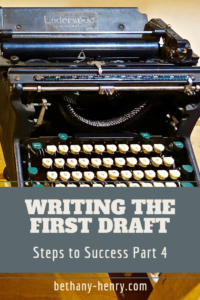There’s something so exciting about writing a first draft. New things being created, new words being put down on the page, new character developments and ideas. In short, everything is new 🙂
That’s not to say the first draft isn’t without its own set of problems and trials! A huge amount of first drafts get abandoned before being finished. So today we’re looking at ways we can set ourselves up well to write (and complete!) our first drafts.
This post is Part 4 of the Steps to Success series designed to walk us through the process of writing a novel from beginning to end. As always, personal preferences and experiences differ. This guide is based in part on my own experiences as well as from authors I have worked with and/or learned from along the way.
Find steps 1-3 here: Getting Started (where we look at our goals for writing and find our starting point), Developing Content (where we dig a bit deeper into what story we want to tell) and Creating an Outline (where we brainstorm the basic structure of our story).
After moving through steps 1-3 we should have a decent concept of what story we want to write along with a rough outline of where we’re going. Feel free to revisit or linger on any of these steps as needed. There is no “right” way to do this and everyone’s process will look a bit different.
However, we don’t want to linger in the planning stages forever.
It can be all too tempting to brainstorm, plan, and worldbuild instead of actually writing. I’m totally guilty of this at times! But at some point we need to make the jump and say, “let’s do this.”
You with me? That’s what the first draft is all about.
It’s not going to be perfect. It won’t be pretty. But it will get done.

So without further ado, let’s get started 🙂
1. Review Our Story Summary
To start with, let’s dig out that story summary you created earlier in the series. We’re looking for a few sentences that convey what you want your story to be about: the main characters, the major plot idea, and hopefully a bit of the story’s theme or character arcs.
If you want to expand on this a bit further that is totally fine too, just find what balance of planning that feels good for you. You can also look over your story’s outline. This should give you a solid overview of the story you are telling.
This is our starting point for our story and what we’ll use to guide our first draft.
2. Make A Plan
Plans are important for getting things done. I could talk about goals all day but I’ll try to keep this short (you’re welcome 😉 ) and break it down a bit.
-
Clarify Your Goals
- Why are you writing? What story do you want to tell? It’s important to know what we want so we can know where we’re going. It can be all too easy to be distracted and lose sight of what it is we are writing, especially in the middle of the process. Goals are important to combat the rabbit trails and the shiny new ideas that come out of nowhere.
- How long of a story do you want to write? This will be influenced by genre and audience. It’s important to have a rough target to shoot for so you can know if the story needs to be expanded or cut down.
- When do you want to finish your first draft? Having a deadline (even a self made one!) is GREAT for keeping us on track with our writing.
For more information on the value and practice of setting goals, check these posts on Setting SMART Goals and Goals and Grace.
-
Make A Writing Plan
- When in your day are you going to actually write? Where are you going to write? Something vague like “whenever I have the time” is not an answer… 😉 For people like me, your writing papers are scattered across your house, your one year old was chewing on your favorite pen so who knows where it is, and you don’t remember the last time you had an entire afternoon free. But if we look for time we can find it. If we make writing a priority we can do it, it just may take some planning and work. So take a few minutes and plan it out if you need to. It’s not a rule that your writing needs to happen at the same time every day but having an idea of where to start is helpful.
-
Decide To Look Forward
- This is sometimes called “turning off our inner editor.” Basically it’s a writing mindset where we decide that we are going to move forward with our writing instead of trying to revise and correct things as we write. We are accepting that our first drafts will not be perfect and that’s okay. Once we finish our draft we can revise, finagle, and edit to make our masterpiece shine, but first we need to get it on paper. Finishing our draft is the goal!
- Personal example: I find it helpful to have a running “to fix” list going alongside my draft so I can list issues as I think of them and go back later to revise them. This helps me get it on paper but keeps me moving forward. Whether this trick works for you or not, make it part of your writing plan to push yourself forward instead of getting caught up in edits.
-
Commit To Self Care
- Taking care of yourself is important! Writing is hard work and sometimes it’s easy to get stressed out or so caught up in our projects that we forget important things. Like, you know, eating and sleeping 😉 So let’s keep that in mind as we prepare to start our first drafts! Before we dive in it’s great to have planned breaks and rewards for ourselves in place. These can keep us sane, healthy, and motivated. Maybe we take a break after every half hour or every thousand words written. Maybe we make sure we go to bed by midnight or take a shower every morning. What does your self care look like?
- Personal example: I like to reward myself with a fresh cup of tea after a half hour or so during my writing time. This gives me a chance to stretch my legs and it keeps me from getting too carried away snacking on junk food O:-) I also frequently tell myself I can’t read any fiction books for fun until I’ve met my daily writing goal. This makes reading a treat and keeps me from getting too distracted before getting my work done.

3. Gather Support
While many people envision writing to be a solitary endeavor, it is actually crucial to have some sort of support system of other people in place. (Even for introverts like me! 😉 )
Having a support system can provide us with both accountability so that we don’t give up on our writing when it gets hard, and also ongoing encouragement.
Shoutout time: I am so very thankful for anyone who has ever asked me how my writing is going. You guys keep me going at times when I’d rather be lazy and I so appreciate that!
This encouragement can come in the forms. We can get support from writing groups, classes, or teachers, but it can also be as informal as a friend or family member who we share our plans with and who will ask us about them. So far as online encouragement goes, I’ve met some great folks through Habitica which is an online platform where people work on their goals together. Nanowrimo also has some awesome forums.
There are wonderful people out there who will encourage you along the way! Even just having one or two supportive people aware of our writing project can help. Don’t ever feel like you need to go at it alone.
Telling people about our writing takes guts because we’re putting ourselves out there but the rewards are so worth it.
4. Have Grace For Yourself
Before we start on our first drafts it’s important to remember grace.
It’s great to have big goals and be working hard but it’s also important that we remember to be patient and kind with ourselves. This is probably the most important aspect of self care. Because sometimes life gets crazy or your writing doesn’t go as planned. And that’s okay.
There is nothing wrong with taking a break or reevaluating how things are going.
Let’s be kind to ourselves, positive in our self talk, and unafraid of failure. We’re embarking on a wild and difficult project. Let’s acknowledge that and give ourselves praise for what we are doing instead of criticism for where we fall short. The first draft is not a place for criticism.
So let’s celebrate every day where we write and give ourselves kudos for every small victory!

5. Have Fun!!!!!
Outlines in hand, plans in place, it’s time to begin a rush of words and the creation of our first drafts! A story is about to be created! Let’s not be intimidated but instead be excited about the places our pages will take us!
I’m excited for us 🙂
Do you love writing a first draft? What is your process for starting your story and do you have any advice or tips to share? I’d love to hear them in the comments below 🙂





I’m a total pantser so for all intents and purposes, my first draft *is* my outline . . . but I love what you’re saying about having a plan and vision . . . and for giving yourself grace in the process.
Thanks, Anna! It’s fun to be on this writing journey with you 🙂 And I love how for you your first draft is where your story really takes shape- such a great reminder of how we all have such different approaches to writing! And yet those same concepts of having a vision and creating our stories remain the same.